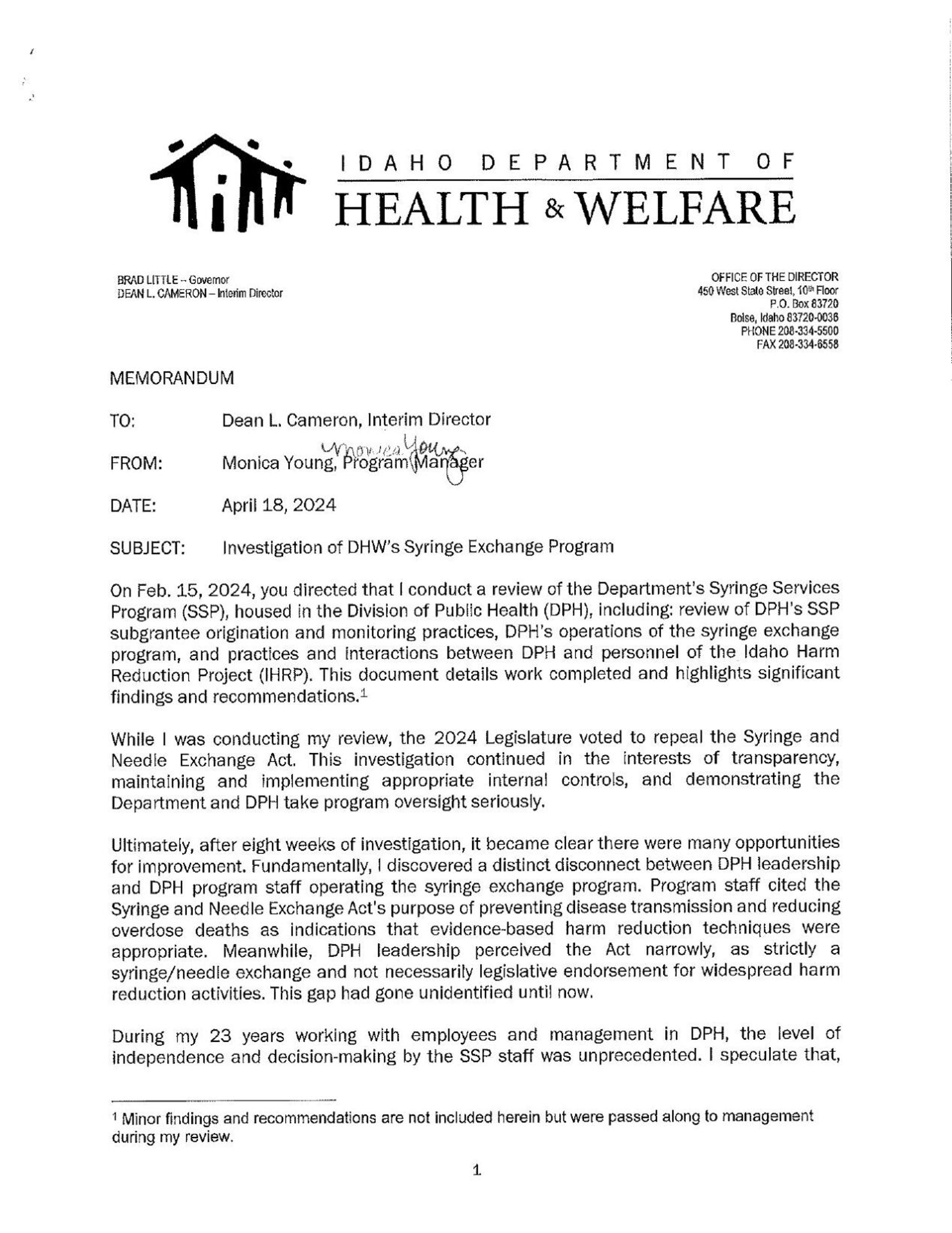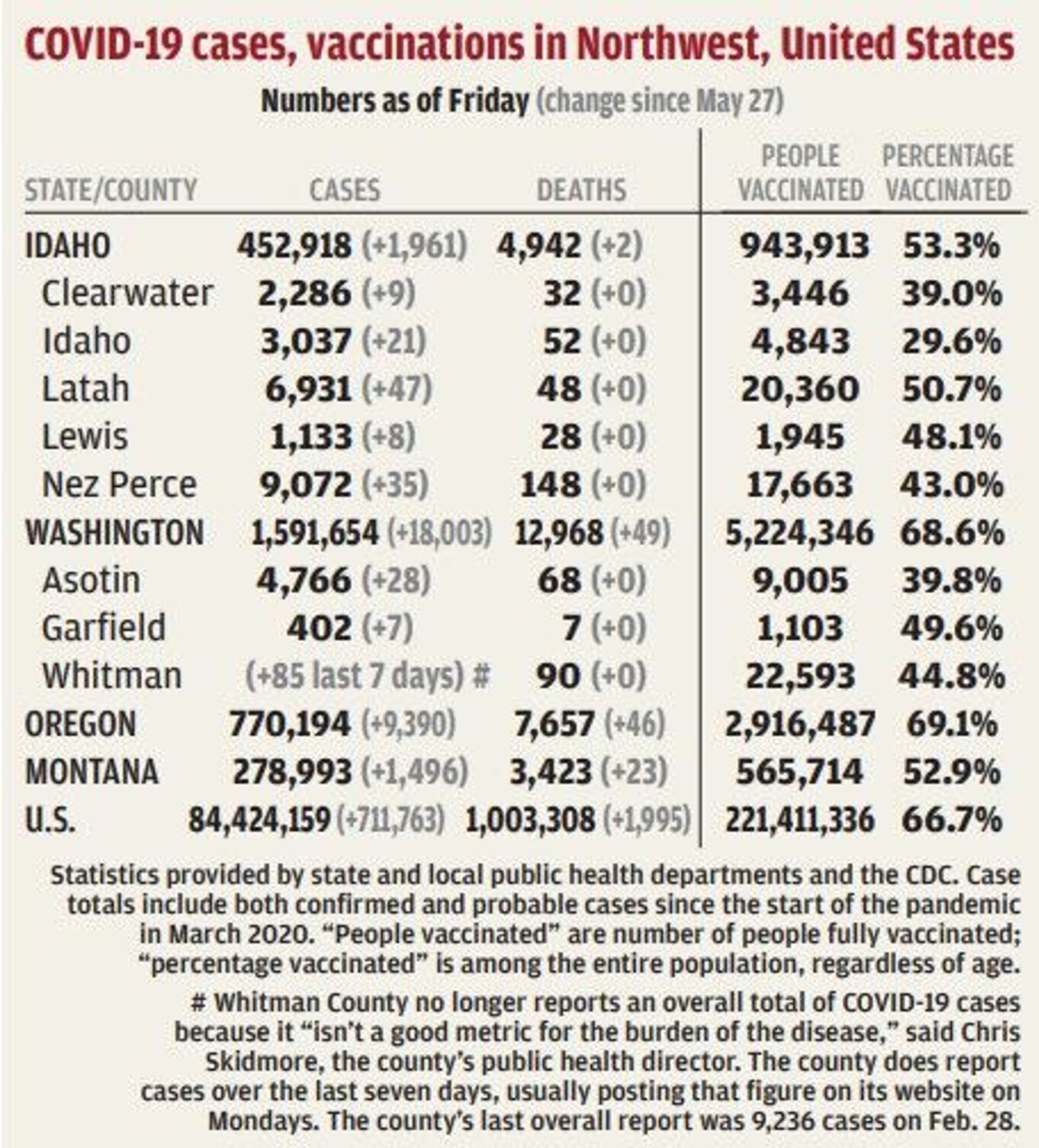Delta variant is dominant strain in Moscow
COVID-19 variant makes up more than 80 percent of cases nationwide; one new death reported in Latah County
The highly transmissible delta variant is the dominant strain of COVID-19 in the U.S. and appears to be the dominant strain in Moscow as well, according to recent tests of the city’s wastewater.
The strain makes up more than 80 percent of cases in the U.S. and Tyler Palmer, deputy city supervisor of public works and services, said the variant was the likely strain in more than 90 percent of the sample collected July 26 from Moscow’s wastewater.
“It is what was expected,” Palmer said.
He said the delta variant was first detected in the city’s wastewater July 14.
“People are traveling more,” City Supervisor Gary Riedner said. “We got the students coming back. There’s all kinds of people visiting in and out so I think it’s probably to be expected that you’re going to see it sooner or later.”
Riedner said he advised Mayor Bill Lambert and City Council leadership of the results and that Lambert indicated he would not issue a public health emergency order, such as a face mask/social distancing order, at this time.
Palmer said the city makes the results available to its healthcare partners like Public Health – Idaho North Central District and Gritman Medical Center in Moscow so that they are aware.
Health department spokesperson Tara Macke said in an email that the delta variant has also been detected in Lewiston’s wastewater.
“This would imply that there may be Delta variant cases within both (Moscow and Lewiston) municipalities,” Macke wrote. “As of yet, that has not been confirmed by any known genetic sequencing performed from a patient specimen.”
However, due to the widespread delta variant across the nation, Macke wrote the delta variant is likely present in local communities even if not detected.
Macke wrote the health district encourages residents to follow the latest U.S. Centers for Disease Control and Prevention recommendations for their safety as well as the safety of others.
“It is the hope that with increased vaccinations and established prevention measures, the spread of the Delta variant and others will be halted or slowed,” Macke wrote.
A city of Moscow news release Friday said that, per the CDC, the delta variant was less than 1 percent of cases in May in the U.S.
The variant spreads about twice as easily from one person to another compared to previous variants. Because new evidence shows some vaccinated people can get or spread the delta variant, the CDC recommends people in areas with substantial or high spread wear masks.
Most spread is among unvaccinated people and in areas with low vaccination rates. Vaccines help prevent the variant from spreading further, the CDC says.
Moscow started testing wastewater for the presence of COVID-19 in May 2020.
As COVID-19 variants started to spread in the U.S., the city initiated a variant testing routine, with the first results received April 13. These tests also indicate the different variants present in the wastewater samples, including the United Kingdom and California variants in the spring of 2021 and, more recently, the delta variant.
Palmer said GT Molecular, a company based in Fort Collins, Colo., that tests for COVID-19 in communities’ wastewater systems, tests Moscow’s wastewater for COVID-19 variants every other week.
The University of Idaho tests the city’s wastewater for COVID-19 concentrations twice a week, he said.
Fifteen new COVID-19 cases were reported over the weekend and Monday on the Palouse, including 11 in Latah County and four in Whitman County. Another COVID-19 death was reported in Latah County and 43 cases were reported in Nez Perce County.
The 11 Latah County cases were two people in the 13-17 age range, four people 18-29, three people in their 40s, one man in his 60s and another man in his 80s.
The new cases increased the countywide total to 3,278, including 3,111 confirmed and 167 probable cases. Of the 3,278, 3,200 recovered, 65 are open and the remaining 13 people have died.
The four new cases in Whitman County increased its total to 4,474 since the pandemic started, according to Whitman County Public Health. Deaths at 52 and hospitalizations at 133 since the start of the pandemic remained unchanged since last week.
Cabeza can be reached at (208) 883-4631, or by email to gcabeza@dnews.com.









